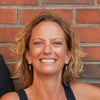When I was a high school kid growing up in South Dakota, a term on a state-wide youth board got me sent to a churchwide gathering in Chicago. There, I met Namibians and first heard about their struggle to overcome apartheid—a word I had only learned a short time before.
I followed the anti-apartheid-to-independence movement in college and at Wartburg Seminary, where the Free Namibia US chapter had been housed. When a favorite professor asked if I would like to be the first female exchange student to Namibia, my answer was a resounding YES.
A summer in Namibia was enriching on many levels! It was my first experience at age 23 of being the only person with my shade of skin as far as I could see. Though the circumstances of being a visitor finding myself as a minority were certainly not comparable to the experiences of those who live their entire lives as a minority in their own country, it was a healthy cultural shock. I remember little Namibian kids asking if they could touch my hair and thinking it was just the reverse of growing up in a predominantly white area—we both had a natural curiosity about what was different, like the texture of our hair, and what was the same, like wanting straight hair if you’ve got curly, or curly hair if yours is straight. It struck me as a beautiful thing when children lacking inhibitions asked honest questions and wondered aloud what it was like to be someone else.
Namibia reminded me of South Dakota with one major city and more rural pockets with varying cultural and geographical identities, including reservations resulting from lamentable historical policies. Sometimes comically, as a guest in rural churches, I was often asked what Americans or whites thought of something. The tendency of people to ask minorities questions assuming their answers represent a plurality of experiences and opinions is apparently universal—and probably never entirely accurate. There’s a spectrum of opinions on any given topic even within my own home.
After having my own children, I was lucky to be able to return to southern Africa on sabbatical, hoping my kids would learn a vital lesson: that their experience is not the only one. Of course, it doesn’t take traveling to Africa to learn this! We can teach it in our churches and help our kids understand that others’ experiences that shape them differ, even in our own backyards.
The natural next step is recognizing that if our experiences differ and we don’t know what it’s like to have someone else’s experiences in regards to skin color, sexuality, gender identity, socio-economics, and so on, then we need to hear those voices. We can’t presume to speak for others or judge the expressions of their unique voice. How this plays out will be different for everyone—from listening to podcasts and reading books to finding ways to broaden networks in community, work, and social circles to include a range of voices. Be mindful of cues and clues as to how others’ experiences have differed from yours and thus, how their lens of seeing a situation (or the world) varies. When appropriate, ask questions—and listen.
What’s it like to be you? What experiences color your lens on life? We all have something to learn from each other.



